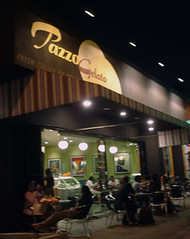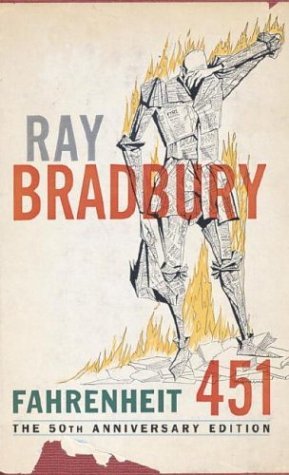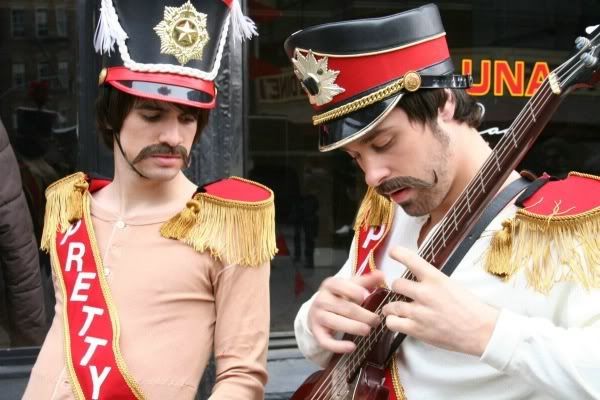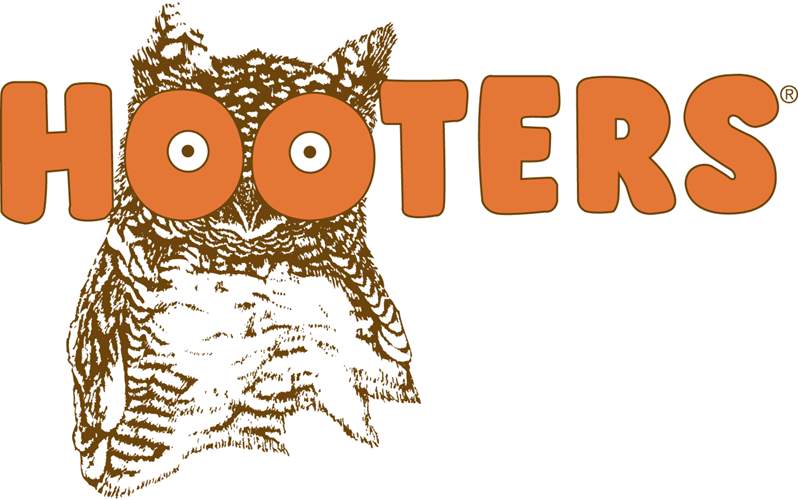Fiction in bits...I think that's rather self-explanatory. The bare bones of it means that a story is written in fragments that the reader is meant to piece together. To some, this might seem a very disjointed and disruptive way of reading a story, but this is something that we are looking at and discovering in my 408 class. So here's a story, using pictures provided by our professor. We were to create a story using the pictures. I am not going to post the pictures here because they are not my property, nor am I entirely sure if my professor would want others seeing the photos. With that said, I hope that my story is informative enough where you don't need the photos to see it.
"The Chicken or the Egg"
17 06 2005 12:17 Stanley Theotokis stands before his late father’s old grocer mart on the exit Razor Rd, off the 15 Highway. It is the last day of business before he closes up for good at 4 p.m. Stan had just put out the last of a cigarette butt, from the last carton sold in the store. He squashed the paper and ash mess with the bottom of his sneaker, erasing with it the years that had faded into a garbled mix of highs and lows, but mostly middle at best. He didn’t want to live with regret or sorrow but felt little inspiration to pursue anything else except to wallow in his own sweat on the dusty stoop of the abandoned mart.
Anatole “Arnold” Theotokis came from Greece thirty five years ago and only brought with him a taste for Ouzo and a baby named Stamitos Theotokis.
“I insist on Stanley now,” he always told strangers when asked about his real name. “Or Stan. Some people call me Stan.”
Two hours before closing, Stan realized that no one else was coming to see the last few moments of Arnold’s Market. He had not bothered to tell people about it, anyway. One customer had come in, named Bud, and he purchased the last bags of old sunflower seeds and a 9V battery. He was a scraggly character, with a few stray gray hairs in his curly mane and his navy blue T-shirt was riding up and exposed a furry, tanned belly button. It appeared to be dry and encrusted with dead skin all over the hair.
“Shoulda sold gas!” he said to Stan, busting over a few chuckles before ending abruptly to cough out phlegm shots. “Yeah, yep. Gas is good money right there. I predict it’ll one day come up to four dollars per gallon. Yes, I am not a good-lookin’ feller, but I’m smart and I get NPR on my little radio.”
His breath was rank when he spoke, and Stanley did his best to hold his head back and hold his breath peacefully. The disheveled man reached into his back pocket, not for his wallet, but for a beat-up handheld radio, stained with black grime in the little crevices and oily streaks all along the back of it. It was once canary yellow, but looked like a light orange to Stan’s eyes. Bud pulled out the antenna swiftly and it was long and rusted. He nearly punched Stan when he did that.
“Heh, see this here’s my radio,” he gleamed with pride. “I get the Vegas radio stations, too. Heh! Give it a listen!”
Bud began to roll the dial through stations, static giving way to static with each and every notch he fiddled. He kept reassuring Stan that he indeed could hear NPR, but was only met with the scratchy dead air.
18 06 2005 3:03 Lizzy Gordon takes Stanley on a hike through the Las Vegas desert. She is pointing to the massive mountain on her right, suggesting that they climb it. Stanley would rather jump off that mountain. Lizzy spent three years of grad school with Stan, collectively drudging over thesis proposals and hunched over late into the night researching in the dusty aisles of library stacks. He always closed himself off never revealing himself, raising a wall of concrete slabs and stiffening when she started to delve into his feelings. He would brush her off nonchalantly when she did, by a subtle change of the subject, or lapsing in a moment of clumsiness to distract her. Lizzy’s years of tapping his egg shell never produced a single yolk. Stanley was hard-boiled and an impenetrable ghost.
After Arnold’s Mart closed, Lizzy invited Stan for a walk through a hiking trail she frequented. He was reluctant at first, but followed along. She noticed his awkward silence and sensed something wasn’t settling with him. She stopped hiking and outstretched her long arms to embrace her best friend, but he shied away, pulling her shoulders off of him and continued to walk forward without saying a word. She skipped her feet to catch up to him and yelled to his turned back.
“What’s the matter with you!”
He faced her, and suddenly the years began to fill his throat, choking him into the same feelings of vulnerability he never wanted her to witness.
“Talk to me, Stanley,” she said, trying to coax him into her confidence.
He shook his head and muttered a few coarse words under his breath.
18 06 2005 5:42 Bud takes a drink from a tiny pool of water on the ground, a Vegas Oasis or God’s gift to desert scumbags. “Good. Clean. Natural. Heh!” He chuckled to himself once more.
Along their trail, Stan and Lizzy vowed a semblance of silence between them. She was afraid to say anything and he was afraid of lashing out at his only friend. Then he saw Bud, the NPR guy from yesterday, and he actually felt comforted in seeing a familiar face. It was an unpleasant face, but a familiar one at that. About forty feet away, Stan saw his head bent down sucking the ground.
“Stanley, I don’t want to walk that way. That guy is a Charles Manson crony, or something,” Lizzy said, holding her arms in front of her chest protectively.
“It’s okay. That’s Bud. He was my last customer yesterday,” Stan said with a big grin overcoming his face. “Hey Bud! Bud!”
Bud looked up from his desert oral and the water dripped from his chin. He looked forward, right into the sun’s rays and was blinded for a second. Then he saw the curly-headed boy with the funny name he remembered from yesterday.
“STAMITOS!” he cried out excitedly. “Stamitos Ryokos Papabaklakavich!”
Stan furrowed his brow at Bud’s bizarre attempt to pronounce the Greek names. Then his core began to fill with worry when Bud came forward, unkempt and with an ogling stare at Lizzy.
18 06 2005 6:10 Lizzy and Stan stop at Love’s gas station and marvel at the intermittent cumulus clouds in the sky. They are floating so low to the ground, Stan feels that if they had climbed that mountain, he would be able to touch the clouds. Bud yelped, from the backseat of Lizzy’s Cavalier. He rapped on Stan’s shoulder repeatedly, pointing to the gasoline price sign.
“Heh! Toldja ya should’ve sold gasoline! Lotsa money, see. And you get pretty girls coming in here. Mmm! See you could’ve made a fortune. If I’da known you were gonna close, I’da helped you with yer business. I know a thing’r two about it. I listen to NPR! So is she your girlfriend?”
Stan shook his head no, then retracted his statement with a gutteral yelp, then shook his head again. His final answer was a shrug. Out of the corner of his eye, he angled his head to glimpse at Lizzy leaning against her car and watching the numbers scrolling rapidly on the gas pumper.
“Don’t matter! I’ll have ‘er if you don’t want ‘er.” Bud said, also leaning over to leer at Lizzy.
18 06 2005 8:28 Just outside of the Circus Circus hotel, Lizzy and Stan spot the billboard for free chips and salsa, and half off a pitcher of margarita. The two of them caroused with Bud and humor his somewhat witty conversation at the bar in the Blue Iguana restaurant. They treat him to the beer, the pitcher of margaritas, the chips and salsa, while he yammered on about how he invented pencil sharpeners. Bud pats Stan on the shoulder, again very roughly. His already foul breath began to merge with the cheap beer and he was like a dragon, firing off dank and heavy shots of slurred speech laced with foul fire breath.
Bud, caustic and babbling, became completely incoherent and Lizzy and Stan used this as an opportunity to slip away from the table, leaving behind a wad of cash for the drinks. Bud’s head was down, buried in his shoulders, and Stan prodded him on the shoulders the same way Bud did.
“You’re a true pal,” he said smiling, though Bud didn’t bother to look at his fleeing friend.
18 06 2005 10:22 Lizzy and Stan have a moment on the escalator outside of Bally’s hotel. She budgets herself to an evening of gambling only five dollars. Lizzy never had the chance to gamble her five dollars. They both realized they had filled up on the chips and alcohol and began to exchange lusty looks before locking lips in lime and salt-flavored kisses.
Late into the evening, long after Stan had fallen asleep on his belly, Lizzy was burning and crawled out of bed to blast the air conditioning. She noticed that Stan had left his rolling suitcase open, revealing his personal items. Her eyes darted to Stan, sound asleep. She could make out the curves of his behind using the dim light that seeped through from the Strip through the eggshell curtains. Then she fell back to the suitcase, and in a backhanded attempt to understand her friend, she began to search through the contents.
She could barely see the paper from the sparse light in the room, but noticed a document, and discovered the death certificate of Anatole Theotokis, claiming the cause of death was by natural causes. She dug deeper, moving aside T-shirts and cargo shorts and then discovered a note written in Stanley’s mangled cursive handwriting. It was a lengthy wad of papers, front and back, with ink blotches dotting the pages sporadically.
She began to read, scrunching her eyes together closely to make out the scribble of letters on the blemished and stained pages. In the letter, she finally discovered the person inside of Stanley Theotokis and it was a detestable soul, full of self-loathing and hurtful language. He spoke of wanting to kill his father, but the stroke beat him to it. He hated his friends, and felt all people were vapid and superficial, and no one wanted real substance to any relationship. She resented his resistance and hated him back, if his words were truly his because all the years of trying to crack his shell were for nothing and ended on that night. Lizzy could have killed him there in his sleep, but didn’t want to deprive him the pleasure of doing it himself.
“Sure, jump off that mountain, Stanley,” she uttered with contempt. “And fly with the wings of a chicken.”
 Now, I will try to phrase my words as diplomatically as possible. I will try to put my own personal prejudices aside, (remember, I like Gone With The Wind so that should reduce my credibility just a tad), and I will not give away plot to those who are in the middle of reading, or are planning to read it.
Now, I will try to phrase my words as diplomatically as possible. I will try to put my own personal prejudices aside, (remember, I like Gone With The Wind so that should reduce my credibility just a tad), and I will not give away plot to those who are in the middle of reading, or are planning to read it. (Bella, played by Kristen Stewart in the film)
(Bella, played by Kristen Stewart in the film) (played by Cedric Diggory, I mean, Robert Pattinson in the film)
(played by Cedric Diggory, I mean, Robert Pattinson in the film) (Kind of a hot image, actually...)
(Kind of a hot image, actually...)


















